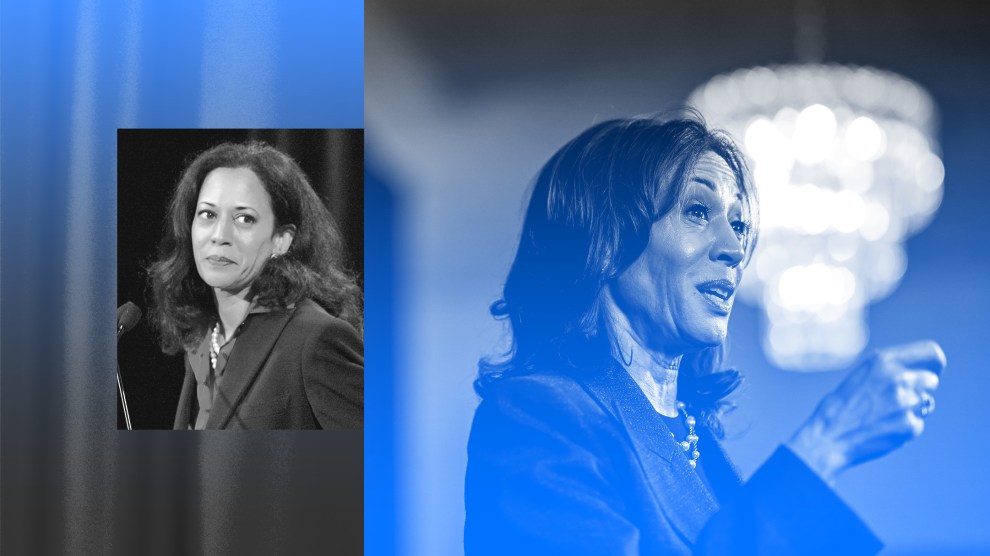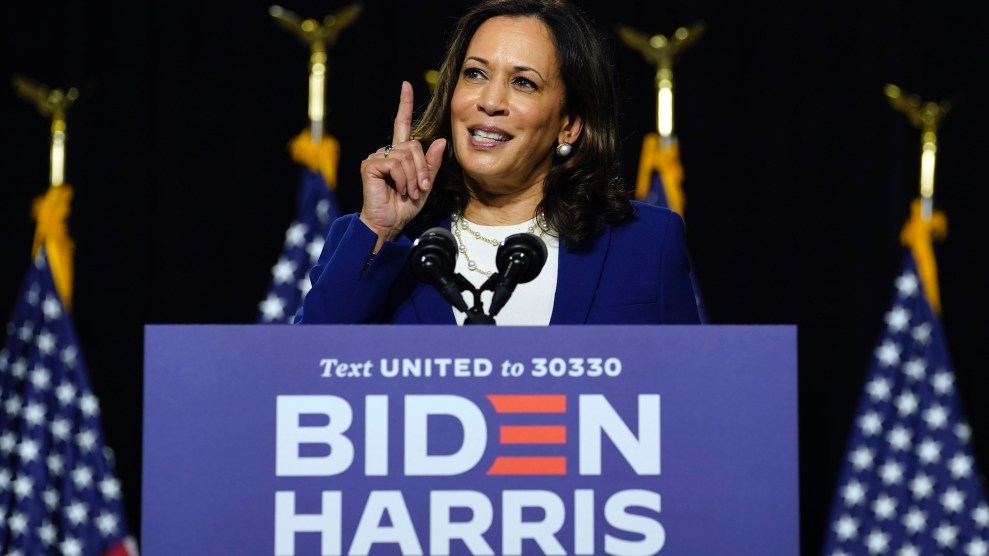
Mother Jones illustration; Michael Macor/San Francisco Chronicle/AP; Brandon Bell/Getty
The first time I met Kamala Harris, in 2007, I was a reporter profiling her for San Francisco magazine. She was in a basement near City Hall, trying to persuade a roomful of low-level ex–drug dealers to find time in their lives for a little self-care. “I have a job that’s just crazy,” she told the crowd of 100 or so young men and women, sounding more like a motivational speaker than the San Francisco district attorney and possible future president of the United States. “I get calls day and night. That’s a lot of stress.” What helped her stay sane, she explained, was waking up early every morning, jumping on the treadmill, and tuning the TV to something upbeat. “My life is like the news, and I don’t need to watch the news. So I watch MTV and VH1. I know every song!”
Her audience—participants in a program Harris created for young, nonviolent ex-offenders called Back on Track—was there because, if they fulfilled all the program’s requirements and stayed out of trouble, their criminal records would be wiped clean. Harris knew that for these mostly Black and brown young people, the keys to their eventual success included educational opportunities, decent jobs, stable housing, and affordable childcare. Helping them move toward economic security was Back on Track’s—and Harris’—primary mission.
But taking care of their bodies and their emotional health was also important. Instead of self-medicating with booze and drugs, she wanted to help them develop the mental habits that could help them persevere when they felt worn down by the world—a mindset for believing they did have the power to determine the course of their futures. Going to the gym wasn’t the point, she told them— though she had wrangled free passes to 24-Hour Fitness for anyone who wanted one. “It’s about being happy and healthy and figuring out ways to cope.” Scanning the room, I could see that many of her listeners seemed … baffled. Since when did the city’s top law enforcement official care about how a bunch of former drug dealers felt?
Scanning the room, I could see that many of her listeners seemed … baffled. Since when did the city’s top law enforcement official care about how a bunch of former drug dealers felt?
Flash forward almost two decades: The Democratic presidential nominee who has spent the past 107 days running an ultramarathon on a tightrope in designer pantsuits and high heels seems light years away from that earnest young DA preaching about the healing power of cardio. Consider Harris’ urgent closing message on the Ellipse a week before the election, flanked by a parade of flags and 75,000 people who were terrified by the prospects of a second Trump presidency. Donald Trump is a “petty tyrant,” the vice president declared—“unstable, obsessed with revenge, consumed with grievance and out for unchecked power.” America is better than he is, she insisted, “America is the greatest idea humanity ever devised, a nation big enough to encompass all our dreams, strong enough to withstand any fracture or fissure between us, and fearless enough to imagine a future of possibilities.”
The 2024 election feels like a second chance, if not the last chance, for the nation, a back-on-track moment. In much the same way that she was encouraging young offenders to seize control of their lives decades ago, Harris spent a good chunk of her speech trying to convince her listeners that they can control the fate of a democracy threatened by bullies, demagogues, and oligarchs. “Each of you has the power,” she told the cheering but jittery crowd, “to turn the page and start writing the next chapter in the most extraordinary story ever told.”
For me, the most striking moment in her speech came when Harris talked about her adored mother, Shyamala Gopalan Harris, who died from colon cancer in 2009 at the age of 70. “I took care of my mother when she got sick, cooking foods that she had a taste for, finding clothes that would not irritate her skin,” Harris told her audience, describing intimate acts of love and kindness that public figures, much less politicians, rarely discuss. Harris the candidate was touting her plan to expand Medicare coverage to include home health care for seniors: “Currently, if you need home care and you don’t have some money to hire someone, you and your family need to deplete your savings to qualify for help. That’s just not right.” Harris the daughter was speaking from a personal place that she has often tried to guard. “Caregiving is about dignity,” she said. “It is about dignity.”
It was a profoundly empathetic moment. And I wondered if her capacity to communicate empathy might just end up saving democracy.
As Americans reach the finish line of the most stomach-wrenching, soul-sucking, exhausting, consequential presidential campaign in memory, many factors will help determine whether Harris will be able to beat back Trump and pull America from the brink.
If she wins, pundits will point to the innumerable GOP mistakes. Abortion bans transforming health care for women (and families) across the US, infuriating not just the tens of millions of people capable of getting pregnant but also their mothers and grandmothers old enough to remember the coat-hanger-abortion era before Roe v. Wade. Then there is the far-right’s embrace of Project 2025 and other extreme policies that would catapult the country back to the 19th century. The grotesque, proto-fascist spectacle at Madison Square Garden. Trump’s rapidly degenerating mental capacity, his accelerating physical decline, his unapologetic embrace of corrupt dictators, his incessant lies. His vice presidential pick, Ohio Sen. JD Vance’s repulsive views about women, especially unmarried ones with no children. Elon Musk’s full-on transformation into a Marvel supervillain, one who turns out to be clueless about politics even as he spends hundreds of millions of dollars trying to disrupt a democracy that helped make him the richest person on the planet.
“Considering they had such little time, some say this is a minor miracle. But it isn’t—it is the result of the right people and the right candidate. It will be a case study for future political scientists.”
Then there’s the Harris campaign, which people who pay close attention to these things are calling one of the best Democrats have ever run. “Considering they had such little time, some say this is a minor miracle,” the Washington Post’s Jennifer Rubin posted on Twitter. “But it isn’t—it is the result of the right people and the right candidate. It will be a case study for future political scientists.” Harris, who spent four years being dismissed as a DEI lightweight, has been a revelation since President Joe Biden bowed out of the race in July, even to her longtime supporters. “It seems to us that something happened to you,” Oprah Winfrey marveled in September, as if “a veil or something dropped… and you just stepped into your power.” Harris responded by (of course) laughing, then added, “You know, we each have those moments in our lives where it’s time to step up.” In the weeks since that virtual rally, despite a schedule that has sometimes seemed to require her to be in 12 places at once, Harris has seemed to gain in strength and clarity of purpose. Through it all, her sunny stamina has been one of her greatest attributes.
But for me, another quality that distinguishes Harris and may even be a determinative superpower in this race is empathy. Obviously, empathy can be a double-edged sword for women politicians, making them seem “soft” and “weak,” their feminine/maternal instincts writ inappropriately large in an arena requiring steely strength. At least that’s what Trump and Vance and Musk and their ilk seem to think—people who at minimum lack any semblance of emotional intelligence and at worst, seem to have learned their social skills on 4chan. It’s not what Democratic strategists have emphasized when they’ve framed her candidacy; she’s the tough-talking prosecutor who recognizes in Trump the type of criminal and predator she spent much of her career trying to put in jail. But scratch the surface of her prosecutorial rigor and consider the policy ideas she’s been talking about on the campaign trail—health care, reproductive care, child care, elder care.
Empathy can be a double-edged sword for women politicians, making them seem “soft” and “weak,” their feminine/maternal instincts writ inappropriately large in an arena requiring steely strength. At least that’s what Trump and Vance and Musk and their ilk seem to think.
Of course, those are perennially Democratic issues, embraced with special fervor by female candidates and their voters. It’s hardly surprising that Harris—who was raised by a single mother and focused on victims of violence and crime for much of her career—would espouse a public policy agenda that is fundamentally about treating people with dignity and kindness.
But you can support empathic policies and still be a terrible person. What’s notable is how many people have a story about her kindness out of the public eye, going back decades. A young woman named Tanene recently went viral on TikTok, talking about how, when she was a homeless teenager in the early 2000s, Harris—not yet a politician—plucked her from the San Francisco streets, deciding “she was going to love me and guide me and cheer me on for literally my entire life.” Twenty years later, she considers Harris her “big sister Auntie mentor friend.”
Lateefah Simon, a MacArthur fellow who ran Harris’s Back on Track program for a few years in the mid-2000s, recalls how, soon after she’d been hired, she showed up to work wearing a hoodie and sweats, like the kids she would be meeting with that day. Harris was not amused. “Why would you ever disrespect your people?” Harris demanded, sending her home to change. “You work for this office. You work for the state, so you represent. Would you go to Pacific Heights”—one of the city’s whitest and wealthiest neighborhoods— “wearing that?” But the next day, Harris presented Simon with a brand-new suit, the very first she ever owned. (Today, Simon is expected to be elected to replace Representative Barbara Lee, representing Berkeley and Oakland in Congress.)
Some of these stories can edge into a kind of Frank Capra sentimentality—except they happen to be true. One of them comes from her former boss, one-time San Francisco city attorney Louise Renne. One day Harris—then a young lawyer heading their division on children and families—arrived in Renne’s office with an armful of stuffed toys for kids whose adoptions were being finalized. “She said, Louise, it’s Adoption Day, we’re going to hand out teddy bears to the children so they can remember this day.” Renne recalled. “So off we went, teddy bears in arms, over to the courthouse. Well, that had never been done before. And I just thought, what an insightful thing to do.”
Now, 25 years later, what Renne remains struck by is Harris’s unusual alchemy of toughness and kindness. “Nobody should ever mistake her for not being tough enough,” Renne told me recently. But Harris also cares about people and consequences, Renne says: “What’s going on in the real world? What is the impact here? Who’s it hurting most? How do we solve the problem to get around the hurt?”
Imagine JD Vance handing out teddy bears. As Adam Serwer famously wrote about the first Trump presidency, “The cruelty is the point.” Four years later, that cruelty continues to be manifest in hideous, even jaw-dropping ways—were we still able to be shocked—but especially in Trump and Vance’s ugly rhetoric about immigrants and in their callous reactions to stories about women who have died and nearly died because of restrictions on abortion care.
Harris, meanwhile, has reached out to Republicans in part by acknowledging their misgivings about voting for a Democrat. The quality of empathy helps explain why she and her vice presidential running mate Minnesota Gov. Tim Walz—the football coach who helped launch his high school’s Gay/Straight Alliance club, the governor who supported free meals and tampons for school kids, the proud dad of a special-needs son—seem to genuinely connect. Theirs is not the Bill Clinton-esque “I feel your pain” schtick that often seems performative.
Empathy has likewise been at the heart of Harris’s messaging on abortion. Where she really catches fire is when she talks about how abortion bans have brutalized the lives of women and families.
Empathy has likewise been at the heart of Harris’s messaging on abortion. From the moment that the Dobbs decision was announced and Biden gave her the responsibility to lobby for reproductive rights in ways he never did, she has offered a full-throated defense of reproductive freedom the likes of which we have never before heard from a sitting vice president or a presidential candidate. She’s been exceptional in her attacks on Trump and his allies overturning Roe v. Wade, passing extreme abortion bans, threatening access to birth control and IVF, and stripping away the ability of women and girls to make decisions about their own bodies. Admittedly, on the what-she-plans-to-do-about-it side, Harris is more circumspect. During the debate, for example, when asked if there were any limits to abortion care that she would support, she replied that she wanted to “restore Roe.” She knows how limited her powers are likely to be on that front, especially if she lacks majorities in the House and/or Senate.
Harris really catches fire when she talks about how abortion bans have brutalized the lives of women and families, like the young Georgia woman, Amber Thurman, whose 2022 death from delayed abortion care left her six-year-old son without a mother. Or what happens to victims of rape or incest or domestic violence: “The idea that a woman who survives a crime of a violation to her body should not have the authority to make a decision about what happens to her body next—that is immoral,” Harris declared in her speech on the Ellipse. “That is immoral.”
So now it’s Election Day and the polls continue to forecast a tight race, though with some unexpected, late-breaking reasons for optimism for Democrats. If Harris wins, it will be because she has managed to break through the Trump–Musk–Fox News chaos machine and convince millions of people who knew hardly anything about her three months ago to support her and her vision of America’s future. Voters have myriad choices this election, with downballot races and ballot measures. But at the top of the ticket, if voters don’t choose empathy, that future will be cruel indeed.

















